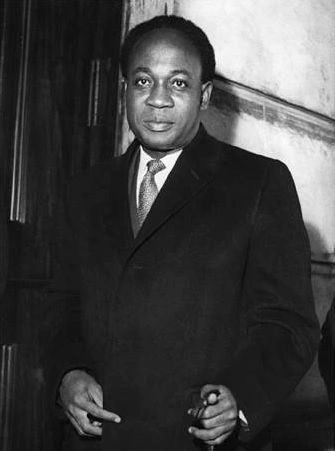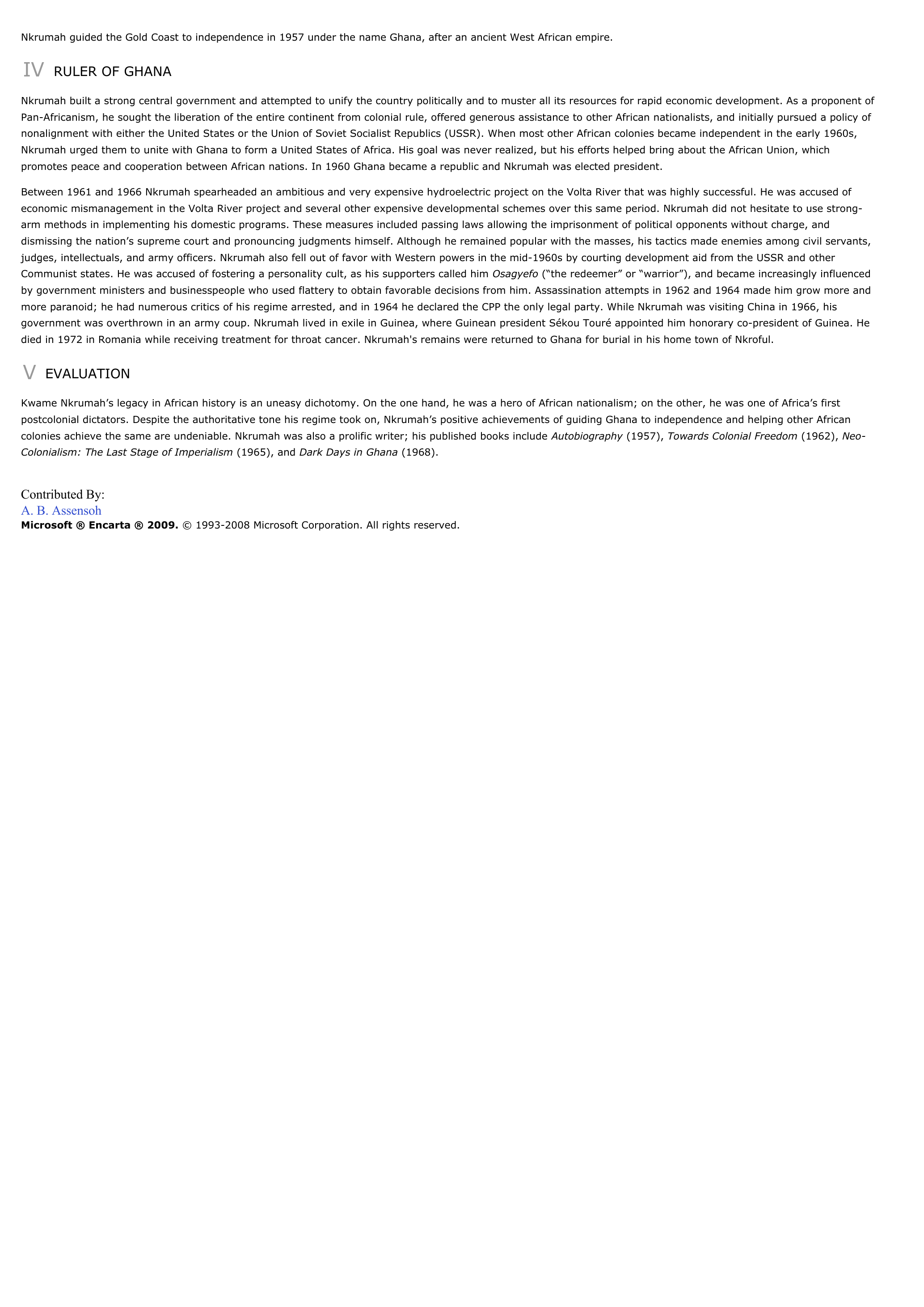Kwame Nkrumah - history.
Publié le 26/05/2013

Extrait du document


«
Nkrumah guided the Gold Coast to independence in 1957 under the name Ghana, after an ancient West African empire.
IV RULER OF GHANA
Nkrumah built a strong central government and attempted to unify the country politically and to muster all its resources for rapid economic development.
As a proponent ofPan-Africanism, he sought the liberation of the entire continent from colonial rule, offered generous assistance to other African nationalists, and initially pursued a policy ofnonalignment with either the United States or the Union of Soviet Socialist Republics (USSR).
When most other African colonies became independent in the early 1960s,Nkrumah urged them to unite with Ghana to form a United States of Africa.
His goal was never realized, but his efforts helped bring about the African Union, whichpromotes peace and cooperation between African nations.
In 1960 Ghana became a republic and Nkrumah was elected president.
Between 1961 and 1966 Nkrumah spearheaded an ambitious and very expensive hydroelectric project on the Volta River that was highly successful.
He was accused ofeconomic mismanagement in the Volta River project and several other expensive developmental schemes over this same period.
Nkrumah did not hesitate to use strong-arm methods in implementing his domestic programs.
These measures included passing laws allowing the imprisonment of political opponents without charge, anddismissing the nation’s supreme court and pronouncing judgments himself.
Although he remained popular with the masses, his tactics made enemies among civil servants,judges, intellectuals, and army officers.
Nkrumah also fell out of favor with Western powers in the mid-1960s by courting development aid from the USSR and otherCommunist states.
He was accused of fostering a personality cult, as his supporters called him Osagyefo (“the redeemer” or “warrior”), and became increasingly influenced by government ministers and businesspeople who used flattery to obtain favorable decisions from him.
Assassination attempts in 1962 and 1964 made him grow more andmore paranoid; he had numerous critics of his regime arrested, and in 1964 he declared the CPP the only legal party.
While Nkrumah was visiting China in 1966, hisgovernment was overthrown in an army coup.
Nkrumah lived in exile in Guinea, where Guinean president Sékou Touré appointed him honorary co-president of Guinea.
Hedied in 1972 in Romania while receiving treatment for throat cancer.
Nkrumah's remains were returned to Ghana for burial in his home town of Nkroful.
V EVALUATION
Kwame Nkrumah’s legacy in African history is an uneasy dichotomy.
On the one hand, he was a hero of African nationalism; on the other, he was one of Africa’s firstpostcolonial dictators.
Despite the authoritative tone his regime took on, Nkrumah’s positive achievements of guiding Ghana to independence and helping other Africancolonies achieve the same are undeniable.
Nkrumah was also a prolific writer; his published books include Autobiography (1957), Towards Colonial Freedom (1962), Neo- Colonialism: The Last Stage of Imperialism (1965), and Dark Days in Ghana (1968).
Contributed By:A.
B.
AssensohMicrosoft ® Encarta ® 2009. © 1993-2008 Microsoft Corporation.
All rights reserved..
»
↓↓↓ APERÇU DU DOCUMENT ↓↓↓
Liens utiles
- YAO SAINT YVES YOBOUE - THE BIOGRAPHY OF KWAME NKRUMAH
- GHANA : L’AUTOBIOGRAPHIE DE KWAME NKRUMAH (résumé)
- Nkrumah Kwame , 1909-1972, né à Nkroful, homme d'État ghanéen.
- Kwame Nkrumah.
- Kwame Nkrumah - Biography.


